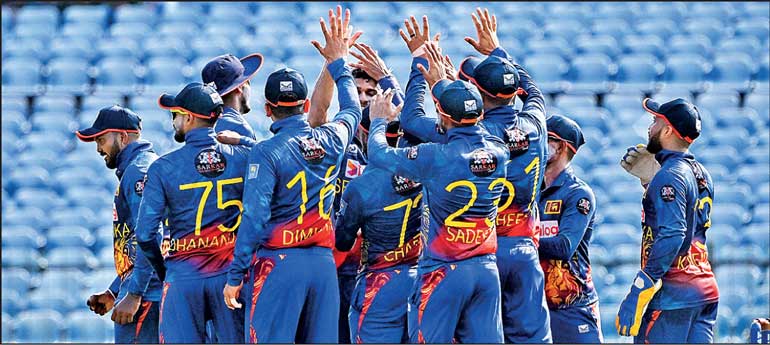Wednesday Feb 25, 2026
Wednesday Feb 25, 2026
Tuesday, 14 November 2023 00:20 - - {{hitsCtrl.values.hits}}

 Cricket, a game interwoven deeply into the fabric of Sri Lanka’s national identity, now finds itself at the crossroads of corruption, political upheaval, and the overpowering influence of international cricket. The recent allegations by the Sports Minister against Sri Lanka Cricket (SLC), involving corruption, mismanagement, and dubious money transfers, have cast a long shadow over the island’s beloved sport.
Cricket, a game interwoven deeply into the fabric of Sri Lanka’s national identity, now finds itself at the crossroads of corruption, political upheaval, and the overpowering influence of international cricket. The recent allegations by the Sports Minister against Sri Lanka Cricket (SLC), involving corruption, mismanagement, and dubious money transfers, have cast a long shadow over the island’s beloved sport.
Historically, cricket in Sri Lanka transcended mere sport; it was a unifying force, a cultural phenomenon. I recall young cricketers in the 90s, their eyes gleaming with dreams of emulating the likes of Aravinda de Silva or Sanath Jayasuriya. However, the taint of corruption in Sri Lankan cricket is not an isolated episode; it’s symptomatic of a broader malaise gripping international cricket.
The Opposition, led by Sajith Premadasa, pushed for a parliamentary debate over these allegations. The resulting discussion, while heated, ultimately led to Speaker Mahinda Yapa Abeywardana bypassing a vote and settling the issue for unanimous agreement on the floor.
Reflecting on past interventions, we have seen the Sports Minister previously disband the elected SLC body, and appoint an interim committee in its stead. The counteraction by SLC, appealing to suspend the interim committee, highlights the deep-seated power struggle within the sport, a struggle not confined to the boundaries of Sri Lanka.
Seismic shift in cricket's economic landscape
Let’s pivot to the international arena, dominated by the colossal Indian cricketing industry. The Indian Premier League (IPL) has become a beacon of aspiration for cricketers worldwide. I recall young Wanindu Hasaranga playing in the fields of Richmond College, Galle, now a multi-millionaire, riding the IPL wave. Mahela and Sanga too benefited immensely from IPL not forgetting many more. This underscores a seismic shift in cricket's economic landscape.
The IPL’s growth from $ 5 billion to a projected $ 30 billion business with the projected investment from MBS of Saudi Arabia raises critical questions about the future of the sport. Consider the staggering influence of a nation like India, with its 1.5 billion population and economic ambitions. This power shift is not unprecedented; English cricket held a similar sway in the 1970s. However, the scale and speed of change today are unprecedented.
In this context, Sri Lanka’s cricketing woes reflect a broader narrative. The emotional resonance cricket holds in Sri Lanka, though substantial, pales in comparison to the fervour in India. The commercial viability of cricket events increasingly hinges on Indian participation and success, a fact underscored by the potential repercussions on TV viewership, advertising, and ticket sales should India underperform in a major tournament like the World Cup.
This raises the question: Is cricket veering away from its ethos, driven by commercial compulsions? The shift from Test cricket and One Day Internationals to the fast-paced T20 format exemplifies this transformation. It’s a change shaped by audience preferences and commercial interests, including those of bookmakers.
Sports compromised by commercial, betting interests
The discussions I had with stakeholders highlighted the growing concern about sports being compromised by commercial and betting interests, potentially leading to staged outcomes and connections to darker aspects like money laundering.
Returning to Sri Lanka’s current plight, the International Cricket Council’s (ICC) suspension of SLC adds to the chaos. The public, much like the political authorities, remains in limbo. The need of the hour is transparent, decisive action to cleanse the system.
Drawing parallels with historical instances, such as, the rebel tours during the apartheid era, where Sri Lankan cricketers faced a 25-year ban we see a pattern of financial interests clashing with the sport’s integrity. Back then, cricketers, driven by financial needs, made choices that had long-lasting consequences. Today’s cricketers, amidst a more professional and commercialised landscape, face similar dilemmas, albeit on a different scale.
In conclusion, the saga of Sri Lankan cricket is more than a national issue; it’s a microcosm of the shifting sands of international cricket. As the game evolves, driven by financial powerhouses like India, it faces the challenge of balancing commercial success with maintaining its integrity and essence. For a nation like Sri Lanka, where cricket is etched in the heart of every citizen, finding a path through this complex, changing landscape is crucial, not just for the sport, but for the spirit it embodies.
In a world where sports and politics are increasingly intertwined, the resolution of these issues is not just a matter of national interest, but a commentary on the evolving narrative of cricket globally. All stakeholders in this beloved game need to steer this narrative towards a future where the sport thrives, not just commercially, but in the hearts of its fans worldwide.